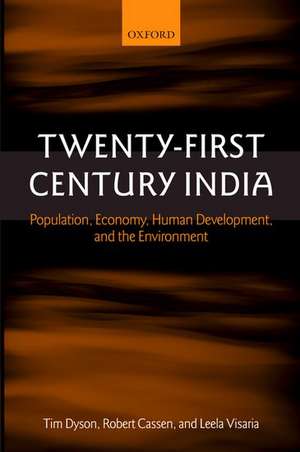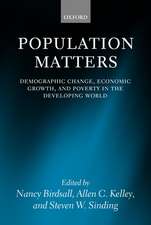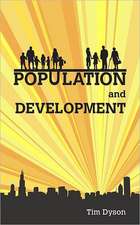Twenty-First Century India: Population, Economy, Human Development, and the Environment
Autor Tim Dyson, Robert Cassen, Leela Visariaen Limba Engleză Paperback – 5 mai 2005
| Toate formatele și edițiile | Preț | Express |
|---|---|---|
| Paperback (1) | 341.43 lei 31-37 zile | |
| OUP OXFORD – 5 mai 2005 | 341.43 lei 31-37 zile | |
| Hardback (1) | 449.45 lei 31-37 zile | |
| OUP OXFORD – 25 mar 2004 | 449.45 lei 31-37 zile |
Preț: 341.43 lei
Preț vechi: 414.61 lei
-18% Nou
Puncte Express: 512
Preț estimativ în valută:
65.34€ • 67.41$ • 55.30£
65.34€ • 67.41$ • 55.30£
Carte tipărită la comandă
Livrare economică 22-28 februarie
Preluare comenzi: 021 569.72.76
Specificații
ISBN-13: 9780199283828
ISBN-10: 0199283826
Pagini: 440
Ilustrații: numerous figures and tables, 1 map
Dimensiuni: 156 x 233 x 24 mm
Greutate: 0.64 kg
Editura: OUP OXFORD
Colecția OUP Oxford
Locul publicării:Oxford, United Kingdom
ISBN-10: 0199283826
Pagini: 440
Ilustrații: numerous figures and tables, 1 map
Dimensiuni: 156 x 233 x 24 mm
Greutate: 0.64 kg
Editura: OUP OXFORD
Colecția OUP Oxford
Locul publicării:Oxford, United Kingdom
Recenzii
A valuable reference book and a model of quantitative analysis and sound prediction.
Notă biografică
Tim Dyson is Professor of Population Studies at the Development Studies Institute at the London School of Economics. Educated in England and Canada, he has held visiting positions at the Australian National University in Canberra, the International Institute of Population Sciences in Mumbai, and the American University of Beirut. Between 1994 and 1996 he was President of the British Society for Population Studies, and in 2001 he was elected a Fellow of the British Academy.Robert Cassen is Visiting Professor at the London School of Economics. He has held positions at Queen Elizabeth House and St. Antony's College at the University of Oxford, the Institute of Development Studies at the University of Sussex, and the World Bank.Leela Visaria is Professor at the Gujarat Institute of Development Research, Ahmedabad. She has been an Associate Professor at the Sardar Patel Institute of Economic and Social Research in Ahmedabad, a research demographer at the Population Reference Bureau in Washington DC, and a demographer at the Economic and Social Commission for Asia and the Pacific (ESCAP) in Bangkok, Thailand.












